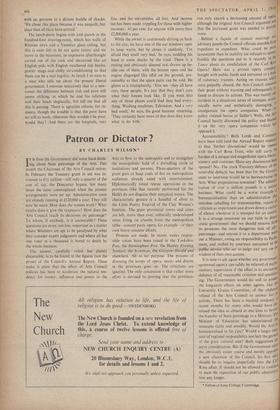Patron or Dictator ?
BY CHARLES WILSON* T is time the Government did some hard think- ling about State patronage of the Arts. This month the Chairman of the Arts Council retires. In February the Treasury grant in aid was in- creased to 1 million—still only a quarter of the cost of, say, the Doncaster bypass, but many times the sums contemplated when the present arrangements were set up. Administrative costs are already running at £120,000 a year. They will now be more. How does the system work? What results does it give the taxpayers? How does the Arts Council 'reach its decisions on patronage'? To whom, if anybody, is it answerable? These questions are more, not less, important in a matter where Ministers are apt to be paralysed by what they consider expert judgments and where all but one voter in a thousand is bored to death by the whole business.
The answer, carefully veiled but plainly discernible, is to be found in the figures (not the prose) of the Council's Annual Report. These make it plain that the effect of Arts Council policies has been to accelerate the natural ten- dency for money, influence and power in the Arts to flow to the metropolis and to strengthen the monopolistic hold of a dwindling circle of institutions and persons. Three-quarters of the grant goes to heap coals of fire on metropolitan audiences already sated with, entertainment. Diplomatically timed rescue operations in the provinces (like that recently performed for the Hallo) do not disguise their untypical nature. The characteristic gesture is a handful of silver to the Little Poetry Festival of the Cley Women's Institute. The great provincial towns and cities are left, more than ever, culturally undeveloped areas living on crumbs from the metropolitan table—concert party opera, for example--or their own brave amateur efforts.
Protests are made. In recent weeks respon- sible voices have been raised in the Yorkshire Post, the Birmingham Post, the, Hanley Evening Sentinel, the Scotsman, the Glasgmv Herald and elsewhere. All to no purpose. The process of dimming the lamps of opera, music and drama in the provinces goes on. The criticisms are ignored. The only concession is that rather more effort is devoted to proving that the provinces can only absorb a decreasing amount of op although the original Arts Council argument that the increased grant was needed to pro' more. Behind a facade of council meetings anJ advisory panels the Council officials stumble from expedient to expedient. What could be nOre lamentable than its inability (or refusal) to ans"er frankly the questions put to it recently in the Times about its annihilation of the Carl R0`3 Opera? Here was a private, opera conicalq bought with public funds and entrusted to a boct of voluntary trustees. Acting on excuses %,'• ich were palpably absurd, the Arts Council reino,a their grant without warning and subsequently fused to discuss its actions. This was merely one incident in a disastrous series of attempts, econa mically naïve and aesthetically damaging. 10 amalgamate the opera companies. When the policy created havoc at Sadler's Wells, the Ails Council hastily disowned the policy and blamed it on the very opera companies which had opposed it.
Accountability? Both Lords and Common' n have been told (and the Annual Report repot,ted it) that 'further discussions' would be opened with the Carl Rosa Trust, who still carry 111 burden of a unique and magnificent opera tibial') scenery and costumes. Have any discussions been opened? No. The stock Treasury defence of miserable debacle has been that for the Govern. ment to intervene would be to bureaucratise the Arts. What preposterous nonsense! The adni tration of over a million pounds is a ser business. What could be a worse example bureaucratisation than an administration 011 Mistakes caballing for statesmanship, rejects 1 criticism as impertinent and draws down a curtain of silence whenever it is stumped for an answer' It is a strange comment on our faith in demo' cratic government that we should remove from its processes the most dangerous task of patronage--and entrust it to a department with out a Minister, owing no responsibility to Parll°. mem, and stalled by amateurs untrained in the public service who act as judge and jury on the wisdom of their own actions.
It is time to ask again whether any government sponsored agency can safely be relieved of pall ' mentary supervision if the effect is to encourage defiance of all reasonable criticism and question' ing. The Government would do well to ponder the long-term effects on other agents. like the University Grants Committee, of the obdt. Ole refusal of the Arts Council to answer for il5 actions. There has been a marked tendency in recent months for many who would have di5' missed the idea as absurd at one time to favour the transfer of State patronage to a Minister. the Minister of Education has administered the museums fairly and sensibly. Would the Arts be bureaucratised in his care? Would a larger t sure of regional responsibility not halt the growth of the great cultural wen? Both suggestions 0 serve consideration. But if the Government tak° the obviously easier course and merely appoints a new chairman of the Council, his first du' should be to inquire impartially into the ca Rosa affair. It should not be allowed to cont one to stain the reputation of our public admini! tr3' tion any longer.
* Fellow of Jesus College, Cambridge. ra vas
idt


































 Previous page
Previous page